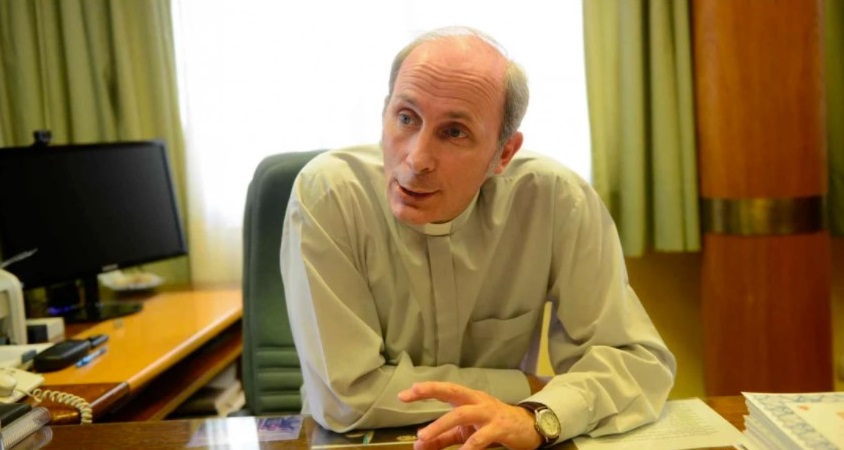ROSARIO (ARGENTINA)
Crux [Denver CO]
February 14, 2022
By Inés San Martín
[Editor’s Note: This is the ninth in a series of articles by Inés San Martín exploring the state of the Catholic Church in Pope Francis’ home continent of Latin America. The eighth can be found here.]
ROSARIO, Argentina – Pope Francis’s homeland is becoming “sick with hatred,” and his figure and message have been coopted, says Father Rafael Velasco, the man who today leads the Jesuits of Argentina, much like the pontiff did back in the 1970s.
“Our crisis is not only political, social and economic; it is also spiritual,” Velasco said. “The soul of the nation is getting sick, if one could speak of such a thing. To get out of this crisis, we must also take into account the soul-spiritual factor: the hatred that we are inoculating ourselves with.”
Speaking with Crux soon after 24 young Argentines died after consuming poisoned cocaine, the Jesuit provincial said that to stop hating is a decision that must first be taken at a personal level, to then be transformed into a political decision.
“When the news broke of these people, addicted to illegal drugs, dying of poison, many reacted saying ‘let them kill themselves, they’re faloperos,” he said. Faloperos is a slur used in Argentina for drug addicts.
Velasco believes there is a “microclimate” within Argentina’s leadership, that simply does not represent most of the country’s population, who currently live under the poverty line.
“There is a cliché in the middle and upper sectors where it seems that being poor is someone who wants to live without working, that they are drug addicts and living off of welfare, and this is not so,” he said, quickly adding that his is not a pobrista, someone who wants for the poor to remain poor, while almost idolizing their situation.
Pobrista is a term currently used in Argentina to attack Pope Francis.
Some within the opposition accuse the pontiff of wanting the country to “remain poor,” and that this is why he is “Kirchnerista,” referring to the left-wing party that has governed during most of the past 20 years.
“And if you try to give a voice to the poor, if you speak about those who struggle with drugs as people of equal dignity to all because they were created in the likeness of God, then you are labeled as a Kirchnerista or a pobrista,” Velasco said.

The problem lies not only in the “erroneous” interpretation the opposition makes of Francis’s message, but also in the wrongful characterization made by those in government. The latter “beat the drum, presenting him as someone he is not, and his message as something that it isn’t.”
Many people in Argentina, he acknowledges, have never heard the pope speak about the importance of paying taxes – and the State using them in a transparent way – nor about the dignity of work. Even less so, he said, “about fighting corruption within politics,” because, the priest says, both sides of the “hatred line” fail to even attempt honest politics.
“In these times, an alleged ‘political use’ of the poor is insistently pointed out,” Velasco said. “Now, let us suppose that there are, in fact, organizations that make political use of the poor. This does not, however, make the basic problem disappear: Too many people lack opportunities, and don’t have access to basic rights, such as education, healthcare, running water and electricity.”
The Jesuit says the pontiff is also politicized in this way.
“When he speaks of the universal right to land, roof and work, for many Francis is nothing but a rural bandit. And yet, he is pointing out three basic rights to which many fellow citizens today do not have access to,” he said.
Velasco is the Jesuit provincial of both Argentina and Uruguay. Restructured 12 years ago, the province has some 150 members, dozens of schools, retreat centers, universities, and several Hogares de Cristo, a network of more than 200 church-run institutes that help people fight drug addiction. Most of them are located either in a slum or in severely impoverished regions of the country. They were created by Bergoglio, before he was elected to the papacy.
When it comes to the “figure” of Francis, who was the provincial of the Jesuits in Argentina between 1973 to 1979, Velasco believes it is “trapped in the problem of hatred.” Those who praised him in the beginning, did so because they believed he hated the Kirchners, but when they saw the pope welcoming then-president Fernandez, “they began hating him,” the Jesuit said. And vice versa: Those who hated him misinterpreted his gestures and became convinced he’s a communist – “and see this as good.”
Both sides of the political divide in Argentina, Velasco said, believe Francis to be a communist. And the media has played its part, in convincing ones and others, that they are in the right.
The fact the pope has yet to go visit his home country, does not help: “Those who support him, run out of ways to explain it, and they too are disillusioned. But it’s not fair to demand someone explain why the Church is run by a communist, and end it with ‘why doesn’t he come’, as if these two belonged to the same train of thought.”
As to why he doesn’t come, Velasco said this is something he never asked Francis – and the two met earlier this year, during a summit of Jesuit provincials in Rome – but he thinks it’s because “he doesn’t believe his visit would help in any way.”
“Whenever he travels, it is because he thinks he can help in some way, but here nobody is going to listen to anything he has to say, and focus on who he took a picture with or who he gave a rosary to,” Velasco said.
Follow Inés San Martín on Twitter: @inesanma
